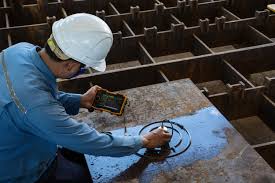NDT pipeline integrity in Egypt is a crucial task that requires constant attention and monitoring to ensure the safety and effectiveness of the country's pipeline system. Non-destructive testing (NDT) plays a vital role in maintaining the integrity of pipelines, as it helps to detect and assess any potential defects or vulnerabilities. In Egypt, where the pipeline network is extensive and serves as a critical infrastructure for transporting energy resources, ensuring NDT pipeline integrity is of utmost importance. This article will explore the challenges and strategies for maintaining NDT pipeline integrity in Egypt to safeguard the nation's pipeline infrastructure.
Ensuring NDT (Non-Destructive Testing) pipeline integrity in Egypt is a crucial task due to the significant role that pipelines play in the country's oil and gas industry. The failure of pipelines can result in environmental damage, safety hazards, and loss of revenue. NDT methods such as ultrasonic testing, radiography, and magnetic particle testing are utilized to inspect and monitor the condition of pipelines without causing damage. Regular NDT inspections help to identify potential issues and prevent catastrophic failures, ultimately contributing to the safe and reliable operation of Egypt's pipeline infrastructure. As the demand for oil and gas continues to grow, the importance of ensuring NDT pipeline integrity in Egypt becomes increasingly vital.
Assessing the NDT pipeline integrity in Egypt: A comprehensive overview
ultrasonic testing of welds

Assessing the NDT pipeline integrity in Egypt: A comprehensive overview covers the extensive analysis and evaluation of non-destructive testing (NDT) techniques used to ensure the integrity of pipelines in Egypt. The study includes an in-depth examination of various NDT methods such as ultrasonic testing, radiographic testing, magnetic particle testing, and visual inspection, and their application to pipeline inspection and maintenance. The report also delves into the challenges and advancements in NDT technology, as well as the regulatory framework and industry standards governing pipeline integrity in Egypt. This comprehensive overview provides valuable insights for stakeholders involved in the maintenance and safety of Egypt's pipeline infrastructure.
Challenges and advancements in NDT for pipeline integrity in Egypt

Challenges in NDT for pipeline integrity in Egypt include the need for advanced inspection technologies to effectively assess the condition of aging pipelines, as well as the requirement for skilled personnel to carry out the inspections. Additionally, the vast network of pipelines in Egypt presents a logistical challenge for conducting thorough and timely inspections. Advancements in NDT for pipeline integrity in Egypt include the adoption of innovative technologies such as guided wave ultrasonic testing and magnetic flux leakage testing, which allow for more comprehensive and efficient inspection of pipelines. Furthermore, there has been a push for the development of automated NDT systems to streamline the inspection process and improve the accuracy of results. Overall, these advancements aim to enhance the overall safety and reliability of Egypt's pipeline infrastructure.
The role of NDT in ensuring pipeline integrity across Egypt's infrastructure
ndt testing services

Non-Destructive Testing (NDT) plays a crucial role in ensuring the integrity of pipelines across Egypt's infrastructure. NDT methods, such as ultrasonic testing, magnetic particle testing, and radiography, are used to detect defects and flaws in pipelines without causing damage to the structure. By regularly conducting NDT inspections, pipeline operators can identify potential issues and assess the condition of the pipelines to prevent leaks, corrosion, and other forms of damage. This proactive approach helps to ensure the safety and reliability of Egypt's pipeline network, ultimately minimizing the risk of incidents and environmental damage. Furthermore, NDT plays a key role in complying with regulatory standards and industry best practices for pipeline integrity management. It allows operators to demonstrate the fitness for service of their pipelines and make informed decisions regarding maintenance and repair activities. Overall, NDT is essential for maintaining the integrity of Egypt's pipeline infrastructure and ensuring the safe and efficient transport of resources across the country.
Understanding the impact of NDT techniques on pipeline integrity in Egypt
Understanding the impact of non-destructive testing (NDT) techniques on pipeline integrity in Egypt is crucial for ensuring the safety and reliability of the country's pipeline infrastructure. NDT techniques such as ultrasonic testing, radiography, magnetic particle testing, and eddy current testing are used to detect and assess potential flaws and weaknesses in pipelines without causing damage. By implementing effective NDT processes, Egypt can minimize the risk of pipeline failures, leaks, and environmental hazards, ultimately contributing to the overall integrity and durability of its pipeline network. Additionally, a comprehensive understanding of NDT techniques can help in developing proactive maintenance and inspection strategies, leading to cost savings and improved operational efficiency in the long run.
Expert insights on NDT for pipeline integrity in Egypt's oil and gas sector
An expert in non-destructive testing (NDT) for pipeline integrity in Egypt's oil and gas sector would likely have a deep understanding of the specific challenges and requirements in the region. This would include knowledge of the types of pipelines used, the environmental and operational conditions they face, and the regulatory standards in place. They would also have insights into the latest NDT technologies and techniques suitable for the inspection of pipelines in Egypt, as well as the ability to interpret and analyze the test results to assess integrity and identify any potential issues. Additionally, an expert might be familiar with the best practices for conducting NDT in the oil and gas sector in Egypt and be able to provide recommendations for optimizing pipeline integrity management.
Exploring the future of NDT technologies for pipeline integrity in Egypt
Exploring the future of NDT (non-destructive testing) technologies for pipeline integrity in Egypt involves considering advancements in equipment, sensors, and data analysis techniques. This includes the potential for implementing advanced inspection methods such as guided wave testing, magnetic flux leakage, and phased array ultrasonics to ensure the safety and reliability of pipelines. Additionally, exploring the integration of drone technology for aerial inspections and remote monitoring systems can offer valuable insights into the condition of pipelines in Egypt. Collaboration with international experts and organizations can also provide valuable insights and best practices for implementing cutting-edge NDT technologies in the Egyptian context.
Case studies and best practices for NDT pipeline integrity in Egypt
One case study in Egypt focuses on the use of advanced non-destructive testing (NDT) techniques for pipeline integrity. This involved the implementation of methods such as magnetic flux leakage (MFL) and ultrasound testing to assess the condition of pipelines and detect defects. The study showed that the use of these advanced NDT methods provided a more accurate and reliable evaluation of pipeline integrity, leading to improved maintenance and cost savings. In terms of best practices, a key recommendation for NDT pipeline integrity in Egypt is the regular inspection and monitoring of pipelines using a combination of techniques. This may include visual inspections, ultrasonic testing, radiography, and eddy current testing, among others. It is also important to prioritize proactive maintenance and to invest in training for NDT technicians to ensure the proper and effective use of testing equipment and techniques. Furthermore, collaboration between industry stakeholders, regulatory bodies, and academic institutions is essential to promote the sharing of knowledge and best practices in NDT pipeline integrity. This can help to establish common standards and guidelines for the inspection and maintenance of pipelines, ultimately contributing to the safe and reliable operation of Egypt's pipeline infrastructure.
Blogger Comment
Facebook Comment